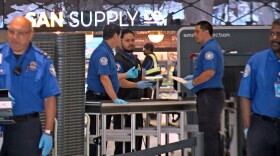The people of San Diego will likely see fewer city services in the coming months. City leaders are just beginning to grapple with a record breaking $180 million deficit.
$180 million is a lot of money. But what does it mean exactly for San Diego? Well, if you were to fill the budget gap by just cutting city jobs, you’d have to eliminate about 1,800 positions. $180 million equals about 20 percent of San Diego’s total budget. To city leaders the figure is daunting. And Mayor Jerry Sanders says the public will feel the impact of the coming budget cuts.
“As we begin putting together a solution to close our budget gap we will examine every responsible alternative to cutting services. But make no mistake about it, there will be cuts in services and the public will feel them,” he says.
Sanders says that will include cuts to the city’s fire and police departments. He says the recession is to blame for the city’s dire financial situation. He points to Los Angeles and San Francisco as examples of other cities also experiencing multimillion-dollar deficits. Councilman Todd Gloria agrees the weakened economy has hurt San Diego.
“When you look at $60 plus million worth of revenue that’s been lost because people are not spending as much so we’re not getting sales tax revenue, people are doing 'staycations,' we’re not getting tourism taxes, that is a function of the recession,” Gloria says. “Additionally, when you look at our increased pension bill this year -- that’s a reflection of the fact that Wall Street is not performing at level that it has in the past, and the city is mandated to cover the difference when Wall Street doesn’t perform.”
San Diego’s annual required pension payment is weighing heavily on the city. Next summer San Diego must write a check for a record $225 million pension contribution. That’s about $57 million more than city leaders were planning on. But Councilman Carl DeMaio doesn’t believe the economy can take all the blame for the city’s budget crisis.
“City leaders are continuing to point fingers at a bad economy, at the state when the fingers ought to be pointed directly back at city leaders. They have continually pushed the issues of unsustainable spending, particularly on pension benefits down the road. And this $180 million deficit is something that many of us have seen coming for a long time,” he says.
DeMaio says the city should focus on fixing its structural budget problem. The city does not generate enough revenue to cover its expenses. Independent Budget Analyst Andrea Tevlin agrees. But she says this year’s deficit is primarily the result of the recession. Though she says past mismanagement is a factor.
“The other factor is underfunding of the pension system in the past. And, again, the impact the economy has had on pension system investments and how that impacts our annual required contribution to the pensions. As well as the fact that it was underfunded for several years and that is catching up to us within the annual required contribution,” she says.
The IBA's office estimates the deficit could be closer to $200 million. Tevlin says the city has already attempted to generate more revenue by increasing user fees. She says there’s not much more that can be done without a public vote. Councilman Kevin Faulconer says it’s time to engage the option voters have already approved.
“I believe that we must pursue managed competition. And I strongly believe that we must continue to squeeze the most we can out of city government in every single department,” he says.
The city has so far been stalled in its attempts to outsource any services because of disagreements with labor unions. IBA Tevlin says she believes outsourcing could save some money, but she says it won’t cover the entire deficit. The city council isn’t waiting until next year to try to find solutions. The budget committee will meet tomorrow to begin tackling the $180 million problem.





